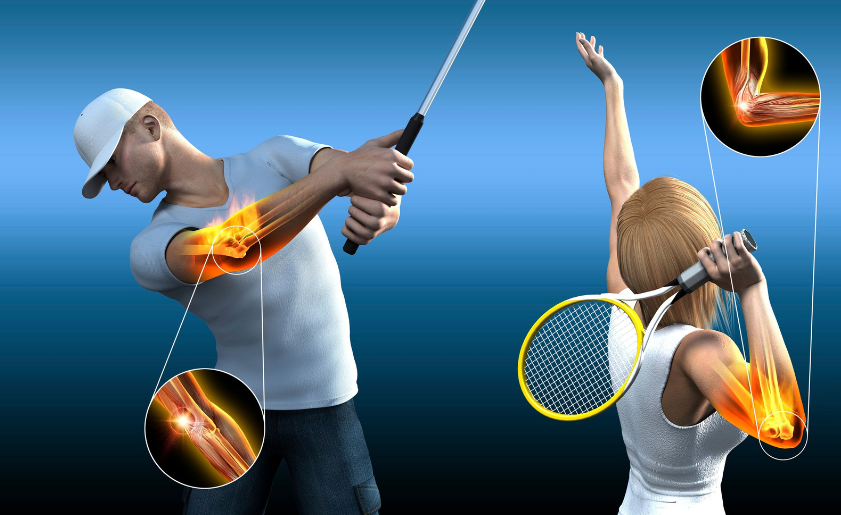
Golf season upon us! With the warmer weather rolling in, more carts are out on the course than usual. With golfers swinging, putting, and driving, it’s the perfect time to prepare for potential injuries you might encounter. The most common one we see is golfer’s elbow. The repetitive motion of swinging a golf club often leads to overuse injuries. Whether you’re a professional and amateur golf player, understanding injuries can help keep players out on the putting green instead of watching from the sidelines. Learn more from Orthopaedic Specialists about golfer’s elbow treatment, symptoms, and preventions tips.
What is Golfer’s Elbow?
Also known as medial epicondylitis, golfer’s elbow is caused by repeated forceful motions. In golf, this includes throwing, lifting, or bending the wrist against a golf club improperly. However, golfers aren’t the only ones who are susceptible to golfer’s elbow. Anyone who engages in an activity that requires frequent bending of the elbow and use of the wrist can experience medial elbow pain.
Golfer’s elbow is caused by “damage to the muscles and tendons that control your wrist and fingers.” The result is pain where the tendons of the forearm meet the inner bone of the elbow. Participating in racket sports, sports that require throwing, weight training with improper technique, or any other forceful and repetitive movement can lead to the onset of golfer’s elbow.
There are also several other risk factors that can play a role in who may be at a higher risk of developing golfer’s elbow which include:
- Being over the age of 40
- Obesity
- Smoking
Golfer’s Elbow Symptoms
- Pain and tenderness on the inside of the elbow
- Stiffness
- Pain or weakness of the wrist
- Numbness or tingling
- Pain or weakness with gripping
- Swelling
To diagnose a case of golfer’s elbow, a medical provider will look at the patient’s medical history and perform a physical exam to test what movements cause irritation and to determine the level of pain.
Golfer’s Elbow Treatment
In most cases, golfer’s elbow can typically be treated with at-home remedies, which include:
- Rest – Avoiding any movement or activity that can easily aggravate the muscles and tendons in the forearm
- Elevation – Propping the elbow up helps stimulate blood flow
- Ice – Icing the affected area for 10-15 minutes every 2 to 3 hours can help reduce swelling and prevent symptoms from worsening. Heat should not be used on a new injury, but can be applied to the affected area for 10-15 minutes before performing exercises prescribed by a healthcare provider.
- Over-the-counter pain reliever and anti-inflammatory medicines
- A splint or brace – These can strengthen as well as protect the tendon and muscles affected; removing some of the strain and tension.
More serious cases of golfer’s elbow may call for treatments such as:
- Rehabilitation exercises – Performing exercises prescribed by healthcare providers can improve the strength and flexibility of the muscles surrounding the elbow.
- Cortisone injections – Injections can provide pain relief and reduce inflammation, however, they are not an effective long-term treatment option and can lead to prematurely going back to the activity that caused the injury.
- Surgery – In the rare case that the tendon tears, doctors may need to perform a surgical repair.
How to Prevent Golfer’s Elbow
For those who participate in activities that can lead to the development of golfer’s elbow, be sure to take these preventative measures!
- Perform conditioning exercises to strengthen the forearm muscles using light weights or squeezing a tennis ball
- Properly stretch and warm-up the muscles before your activity
- Use proper form and technique
- Use the right equipment
- Rest to prevent overuse
Depending on the severity of the injury, golfer’s elbow recovery time can take anywhere from several weeks to months. If you suffer from golf elbow pain, Dr. Stacie Grossfeld, an orthopedic surgeon and elbow specialist in Louisville, Kentucky, recommends seeking golfer’s elbow treatment as soon as the pain starts in order to avoid further damage and or chronic pain.
If you or someone you love has suffered a golfing injury in the Louisville, Kentucky-area, board certified orthopedic surgeon Dr. Stacie Grossfeld at Orthopaedic Specialists PLLC can help. Orthopaedic Specialists PLLC is accepting new patients, and same day appointments are available. For additional information or to schedule an appointment, please contact Orthopaedic Specialists PLLC today at 502-212-2663.

Recent Comments